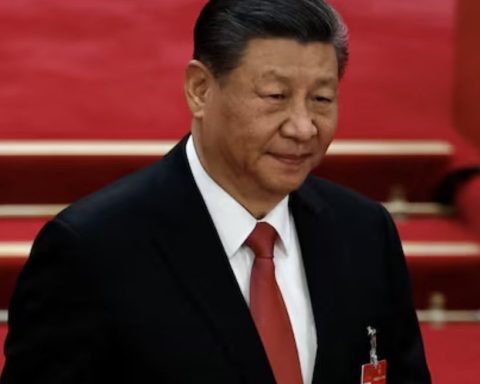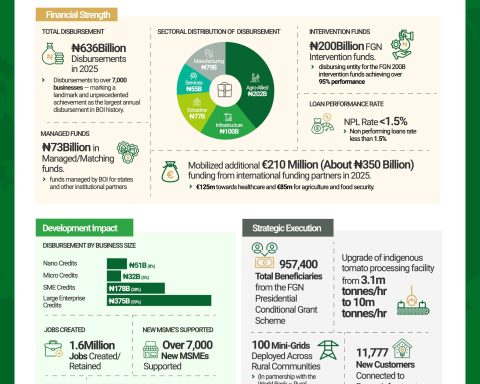Nigerian Nollywood industry could lose a whooping $80.20 million projected revenue if U.S. tariff on Nollywood and other foreign films comes into effect.
Irked by what he calls dying state of film industry in the United States, President Donald Trump is on the verge of imposing 100% tariffs on Nollywood and other foreign films.
Join our WhatsApp ChannelThe President in a post on Sunday noted that “the movie industry in America is dying a very fast death.”
Other countries, according to the President are offering all sorts of incentives to “draw our film makers and studios away from the United States.” Trump concludes by informing that he is authorising the Department of Commerce and the United States Trade representatives to immediately begin the process of instituting a 100% tariff on any and all movies that are coming into our country that are produced in foreign lands, while emphasising “We Want Movies Made In America Again.”
Trump Fear For Hollywood Future:
The President regretted that God’s own country has been making very few movies recently and claimed that other nations have stolen the Hollywood movie industry.

Trump’s tariff announcement follows his appointment in January of actors Sylvester Stallone, Mel Gibson, and Jon Voight as special ambassadors. They were tasked with bringing back business that Hollywood has lost to other countries. At that time, Trump said the actors would be “my eyes and ears” as he set about instituting a “Golden Age of Hollywood.”
Hollywood studios grossed about $30 billion worldwide last year, a 7 per cent reduction from 2023, according to Gower Street Analytics. Although last year’s performance was an improvement on revenues in 2020, 2021, and 2022, it was still about 20 per cent below the pre-pandemic average, scenario which the Trump administration insists need to be arrested.
The 100% tariff if implemented will be a major blow below the belt for Nollywood which has been cited in many quarters as one of the major foreign earners for Nigeria.
Despite Nigerians dwindling economy compounded by sky rocketing inflation, many economic analysts single out Nollywood for its continuous positive impact on the economy and to a large extent positive image laundry that Nigeria has received from far and near.
Below The Belt Policy For High Flying Nollywood:
The policy will no doubt significantly impact the Nigerian film industry, as it will double the cost of Nollywood movies for American distributors and consumers, resulting in reduced demand and challenging for Nollywood filmmakers to access the US market.
Aside from reduced earnings and increased cost of productions, the policy could also affect collaborations between Nigerian filmmakers and U.S. producers, which can limit opportunities for global partnerships.
Nollywood and other foreign movie industries would face strong pressure to adapt. To mitigate the pressure, they will explore alternative markets, negotiate with distributors, or advocate for policy changes to address the impact of the tariff.
Producers will also face increased cost in an attempt to push Nigerian films to other countries where they may not be that popular and raising the awareness and acceptance will not be cheap.
Nollywood as Major Contributor to Nigeria’s Economy:
Nollywood over the years has contributed immensely to Nigeria’s economy. In 2024, it generated over N3.5 billion in domestic revenue and was projected to reach between N11 billion and N12 billion.
The industry’s revenue is expected to reach $65.65 million in 2025, with a projected market volume of $80.20 million by 2029.
Nigerian Entertainment Industry Verdict Davido Was Right!
Only recently, Afrobeats star, David Adeleke, popularly known as Davido, took Nigerian leaders to the cleaners noting that the country has the worst government.
According to him, the country does not have the best leaders. He however noted that despite the poor governance model in the country, the entertainment industry has shined a positive light on the nation’s global image.
He explained that the entertainment industry is now attracting more tourists to the country. The singer asserted that there were more Americans than Nigerians in Lagos last December.
READ ALSO:Nollywood Actor, Okanlawon, Thrills With Flawless Japanese Language
Speaking with Apple Music’s Ebro Darden, Davido said, “I am happy that entertainment switched the narrative. We [Nigerians], don’t have the best leaders. We have the worst governments.
“But the music and entertainment industry in general, has impacted our country’s image abroad positively.
“The entertainment industry is also attracting tourists to the country. Last December, there were more Americans than Nigerians in Lagos. I was like, what are you all doing here?

“Back in the days, we used to be excited when coming to America but now, they are the ones coming to Lagos. It is not just music; it is the culture as a whole. If you go to Paris Fashion Week, about 80 per cent of the models are Africans, the same with the creative directors. It’s impressive.”
There may be need for stakeholders in the Noollywood cum entertainment industry to hold a summit and begin to seek ways of working out cushioning effect ahead of the full impact of Trump’s anti foreign films tariff.
It will not be funny to have the Nollywood take a nose dive like most sectors of the Nigerian economy, In fact this is the time for the government to increased its partnership with the industry and recognise not only its massive contribution to the economy but also to the positive image it has continued to attract for the country, compared to the negatives associated with poor leadership over the years.
Julius Okorie is Chief Sports and Entertainment Correspondent for Prime Business Africa. He began his journalism career with the Champion Newspaper and Sporting Champion and later moved on to Daily Independent and the Nation Newspapers. Okorie joined Prime Business Africa in 2024 bringing on board 20 years of experience in writing investigative news on Sports and Entertainment. His well researched and highly informative articles on Sports Business and general entertainment are followed by a wide range of audience.










